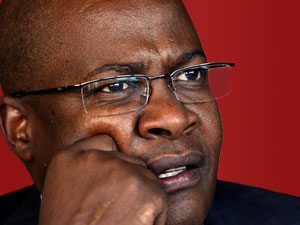
[miningmx.com] – STATE-owned freight and logistics company, Transnet, said it did not fear for its credit status, nor its ability to raise nearly R30bn in debt over the next two years as required by its market demand strategy (MDS).
The MDS is a six-year rolling capital programme aimed at building capacity in Transnet’s divisions that provide infrastructure and services spanning the country’s ports, general goods and mining specific freight and rail, freight engineering manfacturing, as well as pipeline infrastructure.
When the MDS was unveiled in 2012, Transnet said it would spend R300bn over six years on a rolling basis. Total capital expenditure over the next six years is R307bn, or an extra R30bn since it had already spent R22.3bn in the last financial year ended March 31 – the first year of MDS implementation.
As a result of the expenditure, the company’s gearing measured as the ratio of net debt to equity, increased to 44.6%, some 6.4% below the threshold Transnet’s sole shareholder, the South African government, deems appropriate. Gearing was forecast to peak at 47.7% in the 2015 and 2016 financial years, Transnet said.
“We are not overly concerned about the ratio. We said with the MDS that gearing would deteriorate,” said Brian Molefe, CEO of Transnet. He was speaking in Johannesburg today at Transnet’s year-end results presentation in which it recorded a narrow 5.4% improvement in net profit to R4.34bn.
Molefe added that Transnet would spend R27.3bn in capital expenditure in the current financial year of which R15.6bn was required in funding. A further R15bn would be raised in the subsequent 2015 financial year.
This is against difficult global economic conditions compounded by a slowing South African economy – an important development given that a large portion of the group’s expenditure would be sourced from cash flow.
“We think that the financial markets will still be accessible,” said Molefe who added that capital markets in non-western countries could also be accessed such as China, and that Transnet would sell rand-denominated bonds offshore.
“The global rand is a new idea. It’s a frontier we want to push. We are exploring it. There’s a possibility we will fail, but we will try it. There’s a possibility it will be a success,” said Molefe.
“We already have commitments from DFIs and export credit agencis that are quite keen to promote products from their countries such as Germany,” he said.
Molefe’s comments are against a background of deteriorating credit-worthiness of companies such as Transnet and Eskom, another state-owned company, affected by the downgrading of South Africa’s sovereign rating.
Transnet raised $1bn in 10-year bonds in the US in July 2012, a development that Molefe said boded well for subsequent offerings.
Yet investors bid for only R122m ($12m) of a recent offshore R750m capital raising which forced Transnet to abandon it. “We didn’t feel that will be the right signal from a Transnet perspective to accept a R122m ticket on a R750m issue,’ Anoj Singh, Transnet’s CFO told the Financial Times in June.
Commenting on weak GDP growth in South Africa, Singh said Transnet had banked on moderate growth of 3% for the first three years of the MDS which would become more aggressive in the latter four years; in other words, Transnet expected a broad economic downturn of between 24 to 36 months.
There has been speculation lately that ratings agencies would revisit South Africa’s sovereign credit standing, but Molefe said Standard & Poor’s had recently retained Transnet’s BBB/- credit rating.
Foreign investors sold a net R4.71bn ($460m) of South African bonds in May which was the first monthly outflow in a year.










